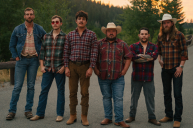Self-described as "goofy and sarcastic" by nature, you wouldn't necessarily know it from listening to S.G. Goodman's music.
The Western Kentucky native's vintage warble is almost exclusively reserved for melancholy-filled missives about strained relationships, growing up gay in a rural, church-going family and fighting back against the "Old Time Feeling" of nostalgia for the way things used to be. However, you wouldn't know this from seeing her live, as her aforementioned wit shines through in her banter between songs, bringing a dose of light to what would otherwise be a set of dark-themed music. According to Goodman, it's been easier said than done to bring this side of herself to fans at shows.
"When I'm having a one on one conversation with someone I don't have any problems bringing my whole self to the table," Goodman tells Wide Open Country. "By nature I'm a very goofy and sarcastic person, but it has been difficult understanding how to incorporate that into my social media and live shows. I wouldn't describe my music as particularly happy, so I try to use my banter to balance that out and show another side of me. It's just as important to laugh and have fun as it is to grieve."
Not shying away from sadness, Goodman leans into and expands on these themes even further with her sophomore album Teeth Marks (out June 3 via Verve Forecast/UMG). The 11 new songs cover previously addressed topics: strained relationships and unrequited love ("Teeth Marks" and "Heart Swell"), understanding and practicing empathy ("If You Were Someone I Loved" and "You Were Someone I Loved"), worker's rights ("Work Until I Die") and the importance of having good mental health and how therapy can contribute to that ("Keeper Of The Time"), among others.
At the forefront of these themes is mental health, empathy and overcoming adversity, all of which are exhibited in the album's closing track "Keeper Of The Time." Per Goodman, the song came to her during the last three years of therapy and learning about the effect that trauma can have on the human body over time. Starting slow and reserved tale, the song—a follow-up to "Space & Time" from 2020's Old Time Feeling—eventually builds into a head-thrashing outburst as Goodman stresses treating trauma urgently, singing "It's not something you should carry / and you better set it loose / it's not something you should carry / it's taking hold of you / it's not something you should carry / and it wakes you in the night / it's not something you should carry / let your heart bring it to light."
"Through therapy I've learned more about things like brain plasticity, how trauma stores in the body, the importance of having help in processing trauma and understanding the consequences when we don't," says Goodman. "Trauma can come from being in a war zone, being a kid stuck in a toxic home or countless other things, but it all acts the same way in your body. That song is a reminder that your body is the keeper of your time on this Earth, so it's critical to treat it well both mentally and physically."
From tackling the stigma of mental health and trauma to that of empathy, Goodman does the latter on "If You Were Someone I Loved" and "You Were Someone I Loved." The two tracks tell of someone who lacks empathy and another who doesn't, all through the lens of someone suffering from opioid addiction, something all too common in her home of Kentucky.
"Unfortunately, that's the way a lot of people interact nowadays," says Goodman. "Our laws and policies are constructed with that in mind because lots of people don't see other's problems as their own, thus hindering progress. I wanted the perspective of someone who does care having the last word in the two songs because it's important for people to know that for all the strangers who don't care there's just as many who do. Love and empathy has a ripple effect of positivity on other people's lives, which is something we could all always use a little more of."
Empathy and mental health are also underlying themes in the punkish "Work Until I Die," a co-write with longtime bandmate Matt Rowan about worker's rights that she first heard him play years ago at a bar in Paducah, Ky. and immediately knew she wanted to sing. Having grown up on a farm accustomed to manual labor—including 12 hour days wielding a weedwacker—the song resonated with Goodman, who altered a few of the lyrics to better fit her life experiences for the album.
"Workers rights have always been something near and dear to my heart," says Goodman. "What's interesting about that song is the worker in it is very aware of the less than ideal predicament they find themselves stuck in. The pandemic has brought with it a resurgence in unions and worker's rights due to just how much time people spend in their lives on the clock for not much more than corporate profits. It's important for us to interrogate what we're working for, our collective goals as a society and how workers can band together to use their collective bargaining to achieve that."
Admittedly not a natural performer, Goodman has found solace through her music and the space it's provided for her to be open and honest about her life's experiences. This has come from not only just putting her thoughts and feelings into song, but also the process of hearing from people at shows who've had similar experiences. While those encounters can occasionally weigh heavy on her, oftentimes they serve as a reminder that she isn't alone in her experiences.
They also serve as proof that all experiences, both good ("All My Love Is Coming Back To Me") and bad, leave "Teeth Marks" on you that impact each other long into the future.
"I'm really scared to play most of the time, but despite that I've somehow managed to keep my nerves together through it all. I'm learning to trust my abilities more, which has pushed me to grow and find courage deep within myself as I move into playing bigger venues and in front of bigger crowds. That's something everyone can relate to. We all have things that scare and make us feel uncomfortable, but part of life is learning and growing from those experiences to be a better mother, father, musician or whatever else you put your heart and soul into."
READ MORE: Ian Noe Paints Portraits of Eastern Kentucky's Highs and Lows on 'River Fools & Mountain Saints'




